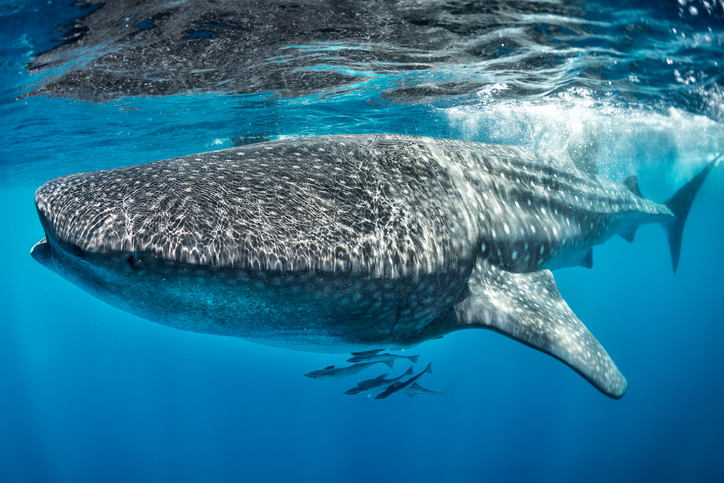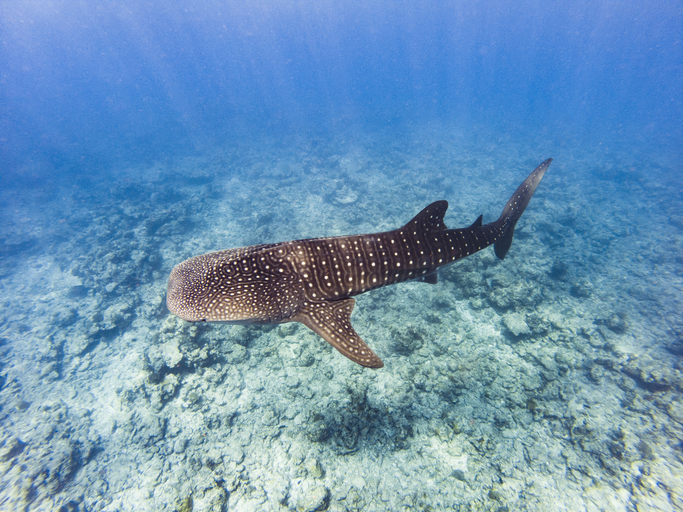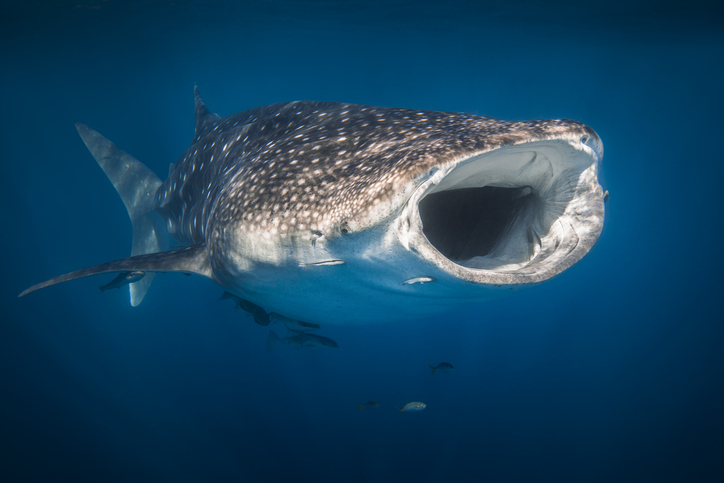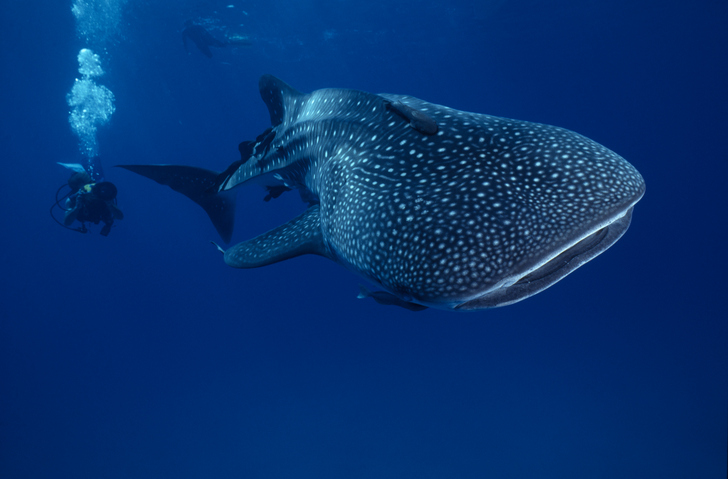While we don’t have whale sharks here at Bristol Aquarium (you won’t find them in any UK aquariums), we’ve pieced together a comprehensive fact file on them, so you can get the measure of these awesome animals.

Massive, majestic, mighty – few superlatives do justice to the magnificent whale shark. These colossal animals are, as you may already know, the largest species of fish in our seas. But aside from sheer size, what else do you need to know about them?
That’s what we’re here to find out.
Your ultimate whale shark fact file

Keen to find out all there is to know about these gilled giants of the sea? We’ve answered every question that matters about the mighty whale shark, so you can get to know these beautiful beasts up close and personal.
How big is a whale shark?
Whale sharks are the largest fish in our oceans, with fully grown adults measuring in at a whopping 12 metres on average – about the length of a double-decker bus! There are thought to be bigger animals out there, however, with unconfirmed reports of some star-backed whale sharks growing up to 20 metres in length.
Of course, all that length means that whale sharks weigh a considerable amount too – over 11 tonnes, in fact. That’s equivalent to around seven cars, a fact that really puts the sheer size and scale of these fantastically large fish into perspective.
What do whale sharks eat?
Don’t worry, humans aren’t on the menu for these gentle giants, which is good news since their mouths can open up to four feet wide! Whale sharks are actually filter feeders who use their powerful gill rakers and suction filters to draw in small prey, before leaving the rest of the work to their surprisingly small teeth.
Whale sharks love to eat small fish, plankton and shrimp, and do so at a rate of around 20 kilograms a day. Though solitary in nature, whale sharks can often be seen feeding together, with large schools of fish bringing lots of sharks into a single area for a feeding frenzy that has to be seen to be believed.

Where do whale sharks live?
Whale sharks prefer warmer waters, so are found exclusively in the tropics, specifically between latitudes 30°N and 35°S. They’re particularly common in Southeast Asia, where they live among the deep lagoons, reefs and atolls of coral reef systems.
Although they don’t need to come up for air like their comparably sized whale counterparts, whale sharks are typically shallow water swimmers, so are easily spotted from fishing and tourist boats. They’re also naturally inquisitive and gentle, so can regularly be seen approaching boats – presumably in search of food.
Are whale sharks endangered?
Sadly, and despite renewed efforts to restore their numbers, whale sharks are now classed as endangered by the IUCN (International Union for Conservation of Nature). Their population has declined steeply in recent years, with current estimates suggesting that only 200,000 or so remain in our oceans.
To put what “endangered” means into perspective; it’s only two tiers away from extinct. That means whale shark populations face an existential threat of disappearing altogether, in spite of several high-profile initiatives to protect their numbers from further decline.

So, what threats do whale sharks face? Let’s take a closer look:
- Demand for their meat, fins and oil: Yes, the sad reality is that whale sharks are still in high demand for the natural resources they contain, including meat, fins and oil. That’s despite a blanket international ban on hunting whale sharks, which some illicit traders seem happy to flout.
- Bycatch from the fishing industry: One of the biggest threats whale sharks face, though, is the fishing industry at large. Each year, hundreds of whale sharks become entangled in fishing gear through no fault of their own, a problem which ultimately results in their demise.
- Whale shark tourism: Thanks to their larger-than-life characters and sheer scale – not to mention the show they put on when feeding in large groups – whale sharks are among the most popular species to see on tourist trips in Southeast Asia and beyond. And while the intentions of such expeditions may be positive, they are having an inadvertent negative effect on whale shark numbers. That’s because they interrupt whale shark feeding patterns, causing a food scarcity that can lead to starvation.
What is being done to protect whale sharks?
The WWF, along with several other marine conservation organisations, are doing much to protect and restore whale shark populations. Their numbers are being monitored by cameras, sonar and satellites in the Coral Triangle – a designated region of the Pacific Ocean with a high proportion of whale sharks – while individual animals are also tagged to keep tabs on their distribution and patterns of behaviour.

Whale sharks vs… find out how whale sharks compare to our resident species
Did you know that Bristol Aquarium is home to no fewer than seven species of shark? Pretty cool, right?
But how do our residents stack up against the mighty whale shark? Let’s take a look by pitting them together in a head-to-head comparison.
| Species | Size | How many times smaller than a whale shark |
| Port Jackson shark | 1.6 metres | 9 times smaller |
| Smooth hound shark | 1.4 metres | 10 times smaller |
| Lesser spotted cat shark | 60 centimetres | 25 times smaller |
| Bull huss shark | 1.5 metres | 10 times smaller |
| Arabian carpet shark | 80 centimetres | 19 times smaller |
| Bamboo shark | 1 metre | 15 times smaller |
| Japanese banded hound shark | 1.5 metres | 10 times smaller |
Of course, size isn’t everything, and if our shark collection reveals anything it’s the huge diversity of sharks to be found in our seas and oceans.
We hope you’ve enjoyed this deep-dive journey into the wonderful world of the mighty whale shark. While we can’t promise you’ll get to see a whale shark here at Bristol Aquarium, there are plenty of other fascinating marine creatures on display, so tap here to book your tickets today.
